
Alfred Binet, born Alfredo Binetti, was a French psychologist who invented the first practical IQ test, the Binet–Simon test. In 1904, the French Ministry of Education asked psychologist Alfred Binet to devise a method that would determine which students did not learn effectively from regular classroom instruction so they could be given remedial work. Along with his collaborator Théodore Simon, Binet published revisions of his test in 1908 and 1911, the last of which appeared just before his death.

Positive psychology is the scientific study of what makes life most worth living, focusing on both individual and societal well-being. It studies "positive subjective experience, positive individual traits, and positive institutions...it aims to improve quality of life." It is a field of study that has been growing steadily throughout the years as individuals and researchers look for common ground on better well-being.

James McKeen Cattell, American psychologist, was the first professor of psychology in the United States, teaching at the University of Pennsylvania, and long-time editor and publisher of scientific journals and publications, most notably the journal Science. He also served on the board of trustees for Science Service, now known as Society for Science & the Public, from 1921 to 1944.
The impact factor (IF) or journal impact factor (JIF) of an academic journal is a scientometric index calculated by Clarivate that reflects the yearly mean number of citations of articles published in the last two years in a given journal, as indexed by Clarivate's Web of Science. As a journal-level metric, it is frequently used as a proxy for the relative importance of a journal within its field; journals with higher impact factor values are given the status of being more important, or carry more prestige in their respective fields, than those with lower values. While frequently used by universities and funding bodies to decide on promotion and research proposals, it has come under attack for distorting good scientific practices.
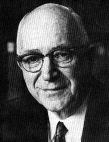
Gordon Willard Allport was an American psychologist. Allport was one of the first psychologists to focus on the study of the personality, and is often referred to as one of the founding figures of personality psychology. He contributed to the formation of values scales and rejected both a psychoanalytic approach to personality, which he thought often was too deeply interpretive, and a behavioral approach, which he thought did not provide deep enough interpretations from their data. Instead of these popular approaches, he developed an eclectic theory based on traits. He emphasized the uniqueness of each individual, and the importance of the present context, as opposed to history, for understanding the personality.
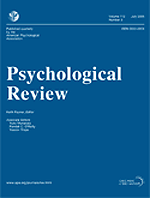
Psychological Review is a bimonthly peer-reviewed academic journal that covers psychological theory. It was established by James Mark Baldwin and James McKeen Cattell in 1894 as a publication vehicle for psychologists not connected with the laboratory of G. Stanley Hall, who often published in his American Journal of Psychology. Psychological Review soon became the most prominent and influential psychology journal in North America, publishing important articles by William James, John Dewey, James Rowland Angell, and many others.
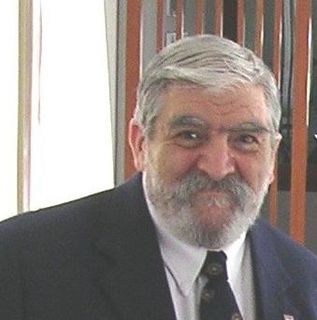
Daniel N. Robinson was an American psychologist who was a professor of psychology at Georgetown University and later in his life became a fellow of the faculty of philosophy at Oxford University.
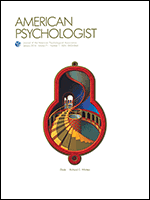
American Psychologist is the flagship peer-reviewed academic journal of the American Psychological Association. The journal publishes timely high-impact articles of broad interest. Papers include empirical reports and scholarly reviews covering science, practice, education, and policy. Current editor-in-chief is Harris Cooper, PhD.

The Journal of Personality and Social Psychology is a monthly peer-reviewed scientific journal published by the American Psychological Association that was established in 1965. It covers the fields of social and personality psychology. The editors-in-chief are Shinobu Kitayama, Colin Wayne Leach, and Richard E. Lucas.
Susan Tufts Fiske is the Eugene Higgins Professor of Psychology and Public Affairs in the Department of Psychology at Princeton University. She is a social psychologist known for her work on social cognition, stereotypes, and prejudice. Fiske leads the Intergroup Relations, Social Cognition, and Social Neuroscience Lab at Princeton University. Her theoretical contributions include the development of the stereotype content model, ambivalent sexism theory, power as control theory, and the continuum model of impression formation.
The Journal of Abnormal Psychology is a peer-reviewed academic journal published by the American Psychological Association (APA). The journal has been in publication for over 110 years, and it is considered to be a "preeminent outlet for research in psychopathology". Beginning in 2022, the journal will be known as the Journal of Psychopathology and Clinical Science.

The Journal of Consulting and Clinical Psychology is a monthly academic journal published by the American Psychological Association. Its focus is on treatment and prevention in all areas of clinical and clinical-health psychology and especially on topics that appeal to a broad clinical-scientist and practitioner audience. The editor-in-chief is Joanne Davila.
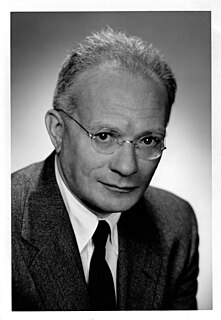
David Shakow (1901–1981) was an American psychologist. He is perhaps best known for his development of the Scientist-Practitioner Model of graduate training for clinical psychologists, adopted by the American Psychological Association in 1949.
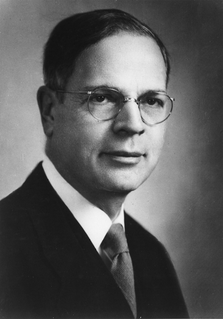
Gardner Murphy was an American psychologist specialising in social and personality psychology, and parapsychology. His career highlights included serving as president of the American Psychological Association and of the British Society for Psychical Research.
Emotion is a peer-reviewed scientific journal, which, as its title states, publishes articles relating to the study of emotion. It is one of several psychology journals published by the American Psychological Association. It was established by founding co-editors-in-chief Richard Davidson and Klaus Scherer in 2001. The current editor-in-chief is Paula R. Pietromonaco. Initially published quarterly, the publication frequency has been bimonthly since 2008.
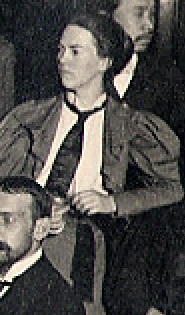
Amy Eliza Tanner was an American psychologist who became well known for discrediting the then-famous medium Leonora Piper after Tanner was allowed to attend six séances with a fellow researcher.

The Journal of Experimental Psychology: Animal Learning and Cognition is a peer-reviewed academic journal published by the American Psychological Association. It covers research in experimental psychology, specifically pertaining to all aspects of animal behavior processes. It was established in 1975 as the Journal of Experimental Psychology: Animal Behavior Processes , an independent section of the Journal of Experimental Psychology. In 2014, the journal subtitle was changed to Animal Learning and Cognition. The editor-in-chief is Ralph R. Miller.
Thomas Teo is a Canadian professor of Historical, Theoretical, and Critical Studies of Psychology at York University in Toronto, Canada. He is a leader in the fields of critical psychology and theoretical psychology.
HARKing is an acronym coined by social psychologist Norbert Kerr that refers to the questionable research practice of hypothesizing after the results are known. Kerr (1998) defined HARKing as “presenting a post hoc hypothesis in the introduction of a research report as if it were an a priori hypothesis”. Hence, a key characteristic of HARKing is that post hoc hypothesizing is falsely portrayed as a priori hypothesizing. HARKing may occur when a researcher tests an a priori hypothesis but then omits that hypothesis from their research report after they find out the results of their test; inappropriate forms of post hoc analysis and/or post hoc theorizing then may lead to a post hoc hypothesis.












